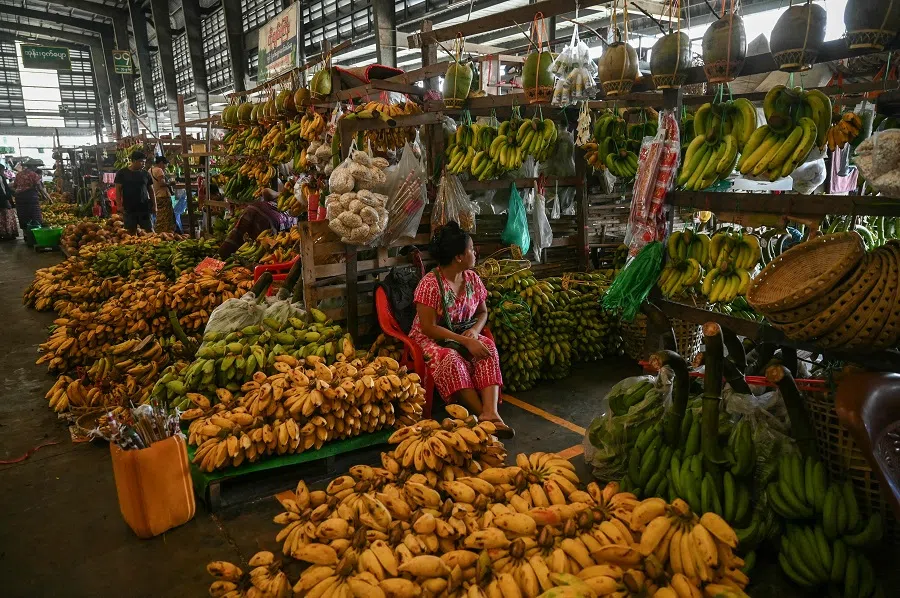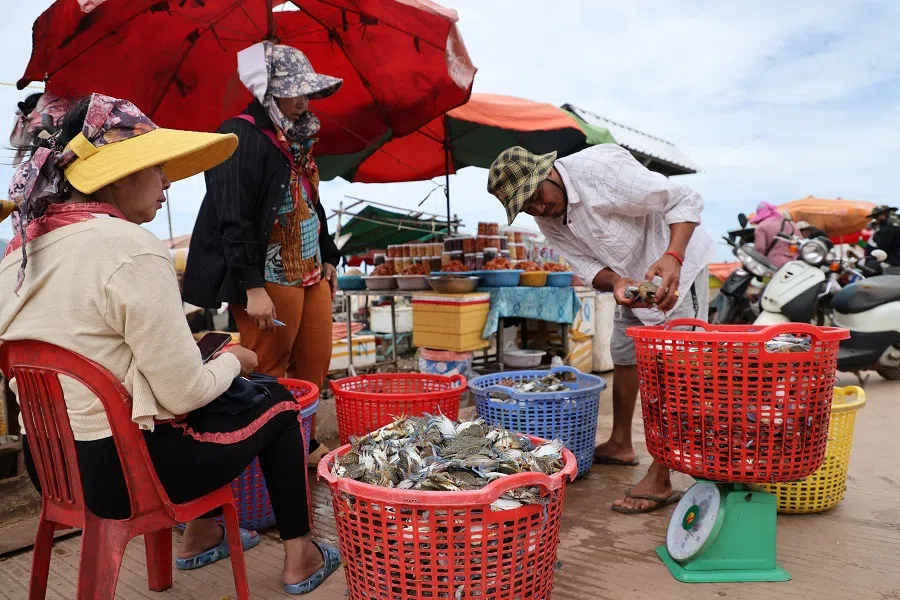Chinese in the crosshairs of 'mushrooming' transnational cybercrime
Cybercrime scams and the related kidnappings have exploded since 2020, when the Covid-19 pandemic and subsequent economic downturn fuelled the number of such crimes, including fake online romantic ploys, bogus investment pitches and illegal gambling schemes. Scam centres were concentrated in Cambodia, but have now been found in Laos and Myanmar, and at least four other Asian countries have become human trafficking hubs.

(By Caixin journalists Qin Jianhang and Han Wei)
It was 25 May this year, an otherwise normal day, that Lin Ping* received a shocking WeChat message from her 19-year-old son Xiaowei*, saying he and a friend had been "tricked and sold to Myanmar", pleading for her to seek help from the Chinese police.
In the frantic messages that followed, Xiaowei said he had been lured by the promise of a job transporting raw jade stones in Xishuangbanna, in southwest China's Yunnan province, Lin told Caixin.
But upon arrival he had been kidnapped and smuggled to neighbouring Myanmar, where he was forced to work for an online and telecom scam operation located in a compound in Kokang in northern Shan State, a hotbed of cybercrime activity.
Lin, a resident of Baishan city in northeast China's Jilin province, said she had contacted the gang holding Xiaowei in August through an intermediary, who told her 450,000 RMB (US$62,545) would buy her son's freedom. But it was far more than she could afford.
Lin has had no subsequent contact with Xiaowei since 4 September, with the silence instead punctuated by photos sent to her phone of him being beaten by his captors, apparently because he failed to achieve their so-called "performance targets" in terms of illicit gains from cyber scams.
Xiaowei is just one victim of organised cybercrime gangs operating across Southeast Asia and China's southern borders in countries such as Myanmar and Cambodia that have enslaved hundreds of thousands of people and netted tens of billions of dollars in profits stolen from unsuspecting victims of their scams.
Scammers operating in one unnamed Southeast Asian country are estimated to be generating between US$7.5 and US$12.5 billion, or half the value of that country's GDP...
The situation is getting worse. Cybercrime scams and the related kidnappings have exploded since 2020, when the Covid-19 pandemic and subsequent economic downturn fuelled the number of such crimes, including fake online romantic ploys, bogus investment pitches and illegal gambling schemes.

Scammers operating in one unnamed Southeast Asian country are estimated to be generating between US$7.5 and US$12.5 billion, or half the value of that country's GDP, according to a report late last month by the United Nations Office on Drugs and Crime (UNODC).
"Trafficking in persons connected to casinos and scam operations run by organised crime has mushroomed across Southeast Asia, particularly in the Mekong" said Jeremy Douglas, UNODC Regional Representative to Southeast Asia and the Pacific last month.
Such online and telecom scams involve not only fooling unsuspecting people into transferring money, but also establishing an entire grey industrial chain designed to support the illicit enterprise, which includes the theft and resale of personal information, human smuggling, forging of official documents and other crimes.
Victims, not criminals
"In cross-border telecom fraud, people play a dual role as both the source of benefits and the means to generate those benefits," said Jian Kunyi, a law professor at the Yunnan University of Finance and Economics.
Telecom fraud inevitably gives rise to a new form of human trafficking, whereby criminal groups extract benefits from both trafficking people and through the use of the victims they traffic to exploit others, said Jian.
The United Nations (UN) in an August report said criminal gangs have forced hundreds of thousands of people in Southeast Asia into participating in unlawful online scam operations.
At least 120,000 people in Myanmar and roughly 100,000 in Cambodia "may be held in situations where they are forced to carry out online scams," according to the report, which cited unnamed "credible sources".
"People who are coerced into working in these scamming operations endure inhumane treatment while being forced to carry out crimes," said UN High Commissioner for Human Rights Volker Türk.

People trafficked into the online scam operations often face a range of serious violations and abuses, including threats to their safety and security; and many have been subjected to torture and cruel, inhuman and degrading treatment or punishment, according to the UN report.
"They are victims. They are not criminals," said Türk.
The International Criminal Police Organization, commonly known as Interpol, in June issued a global warning about fraudulent activities related to human trafficking, saying initially, these scam centres were concentrated in Cambodia, but have now been found in Laos and Myanmar.
Moreover, at least four other Asian countries have become human trafficking hubs, and there's evidence that regions such as West Africa are adopting similar practices, with widespread cyber financial crimes, said Interpol.
... Chinese aren't just the victims of these crimes, they also are often the perpetrators.
Over the past few years as the scale of the problem has exploded, Chinese nationals have become a primary target of criminal syndicates, who use Chinese facilitators that employ scams, kidnapping or human trafficking to entrap their victims abroad, China's top procuratorate said in September.
They recruit victims by enticing them overseas with the promise of non-existent high-paying jobs or through people smuggling pipelines, then detain them illegally in foreign countries, forcing them to engage in online frauds and scams, according to China's Ministry of Public Security.
But Chinese aren't just the victims of these crimes, they also are often the perpetrators.
A Chinese national living in Cambodia who has been assisting authorities to rescue trafficked people told Caixin that many of the online gambling and telecom fraud operations in Cambodia are run by Chinese nationals, and a significant portion of them are fugitives.
Media reports and social media posts have revealed how young Chinese have been detained in compounds overseas, essentially becoming enslaved. Operating these facilities requires a large number of individuals who understand Chinese and are familiar with the domestic environment.

The spike in the numbers of cases tells the story. In 2022, China busted 464,000 cases of telecom and internet fraud, compared with 256,000 in 2020, according to statistics from the Ministry of Public Security. Throughout that year, authorities stopped suspicious money transfers totaling 318 billion RMB to scammers, authorities said.
The situation has become so dire, that in mid-August, law enforcement authorities of China, Thailand, Myanmar and Laos launched a joint campaign to crack down on illegal gambling and fraud perpetrated by organised crime rings in their border regions.
In September, China and Cambodia agreed to team up on combating cross-border crimes such as online gambling and telecom fraud through law enforcement and security cooperation.
And in late September, more than 150 Chinese nationals suspected of committing cross-border telecom fraud were deported from Indonesia as part of Beijing's international cooperation in cracking down on such crimes.
If negotiations fail or no ransom is paid, the detained are often subjected to physical abuse, and some even resold to other criminal groups.
Trapped in Myanmar
Since the beginning of the year, Caixin has learned from multiple sources who claim their relatives have been deceived into working for the operators of telecom scams overseas. Once abroad, they are detained and held against their will, with the criminal groups demanding hundreds of thousands of RMB from the victims' families to secure their release, according to sources.
If negotiations fail or no ransom is paid, the detained are often subjected to physical abuse, and some even resold to other criminal groups.
A college student surnamed Li told Caixin he was sold three times and worked for four scam organisations after he was trafficked to Myanmar through Xishuangbanna. Li was also deceived by fake job recruitment and trafficked to Myanmar in late July.
He had been coerced to conduct bogus investment pitches and a pornographic live-streaming scam, which lures people into watching pornographic videos or recording them and then blackmailing the viewers, said Li, who was eventually freed in September after his family paid a 400,000 RMB ransom.
The government has tried to warn people of the danger. Since February 2022, China's foreign ministry has issued multiple warnings to Chinese nationals travelling to Myanmar, informing them of the risks of fake job offers.

However, record youth unemployment and a faltering post-Covid economic recovery at home means the promise of high-paying jobs, even in seemingly lawless border regions of countries such as Myanmar, will remain a powerful lure for Chinese nationals.
Undoubtedly, it is the lawlessness in strife-torn Myanmar that has made it a preferred hideout for scammers exploiting the country's ethnic conflicts and fragmented autonomy, especially organised crime groups from China.
It should come as no surprise, as China and Myanmar share a border of 2,185 kilometres, with the Yunnan section about 1,997 kilometres.
On both sides of the border, the majority of people share similar customs, languages and culture. In many areas of northern Myanmar, southwestern Chinese dialects are commonly spoken, and both the Chinese currency and domestic telecom signals are used.
The crime situation worsened after 2019, when Myanmar enacted the Gambling Law, allowing foreigners to establish casinos in the country. This facilitated the migration of online gambling and telecom fraud groups that were facing crackdowns in both China and other Southeast Asian countries to northern Myanmar. Some local armed groups in the region provided them with shelter and profited from it.
To address this, in March 2023, law enforcement authorities of China, Myanmar and Thailand held a meeting in Bangkok to discuss joint actions to combat human trafficking and cross-border cybercrime scams.
... the current crisis is viewed by some as the result of a tightened a crackdown in China beginning in 2019 that forced many criminal gangs engaged in scamming operations to move to Southeast Asian countries including Myanmar and Cambodia.
The action has yielded some results. According to Caixin's calculation based on public information, as of 16 September, China has extradited or taken into custody over 1,700 suspects involved in cybercrime scams from countries including Myanmar and Laos. Most of the suspects were handed over by foreign authorities to China after they launched the joint crackdown.
In early September, authorities of Wa State, an autonomous region in northeastern Myanmar launched a crackdown on local telecom fraud operations and detained 1,508 individuals, including 1,207 Chinese nationals, according to the Ministry of Public Security.

The crackdown was a joint action by law enforcement authorities in Wa State and Pu'er, Yunnan province, in which the Chinese side provided tip offs about the criminal operations and suspects, said the ministry.
More joint operations like this have been carried out. On 3 September, the public security department in Xishuangbanna launched a joint crackdown with a district of Myanmar's Shan State, in which 269 telecom fraud suspects were detained, including 186 Chinese nationals.
But the effects of such operations remain to be seen and some observers have expressed concerns that the high-profile crackdowns will only force the scammers to hide and relocate.
There is precedent for such an outcome. Indeed, the current crisis is viewed by some as the result of a tightened a crackdown in China beginning in 2019 that forced many criminal gangs engaged in scamming operations to move to Southeast Asian countries including Myanmar and Cambodia.
But despite the increased government focus on combating the spiraling crisis, the thousands enslaved by the scammers in foreign camps and their families, as well as those duped out of millions via online hoaxes, can only hope for some measure of justice to assist with their plight.
Lin is one of those looking for any sign of hope for her son Xiaowei. As the days have turned to weeks since she last heard from him, she now spends her time anxiously monitoring news about Kokang, where she believes her son is being held, searching for any clue that may aid in a rescue. A rescue that may or may not come.
*The names Lin Ping and Xiaowei are pseudonyms.
This article was first published by Caixin Global as "Cover Story: Chinese in the Crosshairs of 'Mushrooming' Transnational Cybercrime". Caixin Global is one of the most respected sources for macroeconomic, financial and business news and information about China.





![[Big read] China’s 10 trillion RMB debt clean-up falls short](https://cassette.sphdigital.com.sg/image/thinkchina/d08cfc72b13782693c25f2fcbf886fa7673723efca260881e7086211b082e66c)